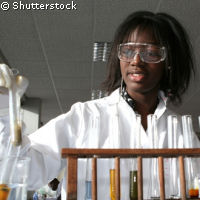Africa: chasing a science revolution with a little help from Europe
'The world has witnessed how science and technology have driven economic development and growth,' said Abdoulie Janneh, UN Under-Secretary-General and Executive Secretary of the Economic Commission for Africa, when in Brussels on 29 November. Now Africa wants the same for itself, and is ready to embrace science, in partnership with Europe. This was the message delivered by Mr Janneh to a hearing on 'Science with Africa' at the European Parliament. The hearing came at a time when this topic is gathering pace: a resolution from the European Parliament is in the offing, and a large international conference is planned for March in Addis Ababa, Ethiopia. The March conference will be a 'make or break issue for Africa', according to Mr Janneh. He told CORDIS News that no part of the world has developed without science, and that now Africa must find the resources to invest. The top African research investors are South Africa and Egypt, which invest 0.4% and 0.3% of GDP in research respectively. Some of the additional funding must come from development funds, and some from the private sector. The optimum balance will be debated in Addis Ababa in March, said Mr Janneh. The Parliament hearing was intended to contribute to discussions on the mechanisms that could be used to improve the access of African-based institutions to international, collaborative research and development (R&D) projects. Mr Janneh welcomed the event and the goodwill that he felt was in evidence. But now is the time to operationalise the commitment that is evident in Europe and Africa, and to move beyond talking, he said. MEP Pilar del Castillo Vera, chairing the hearing, agreed. The design of a practical model that can bring African and European scientists together must follow, she said. 'The next step really has to be action.' At institutional level, two new steps are already planned. The European Commission is to have a second delegation in Addis Ababa, focusing on the work of the African Union. A Science with Africa office will also open in order to facilitate links between European and African scientists. Polish MEP Jerzy Buzek referred to the forthcoming Addis Ababa conference as 'starting Lisbon for Africa'. In the EU, the Lisbon Strategy has the goal of making Europe's economy the most competitive in the world by 2010. Embracing research as a means to develop a knowledge economy is a path that Europe opted to follow some time ago. As highlighted by Jorma Routti of Finland's Creative Industries Management, Europe is moving from a fishing and farming economy. If Africa is to follow the same route, the continent must take responsibility for creating the right environment and introducing the right policies. Indeed this is already being done, as explained by Aida Opoku-Mensah, Director of the information and communication technologies (ICTs) and science and technology division at the UN's Economic Commission for Africa. Regional cooperation is strongest in agricultural research, and further collaboration and networking is being encouraged. 'There are pockets of expertise. But this is not optimal. If we have four countries leading in a field, we want them to cooperate with their neighbours. They are ready to do that,' said Ms Opoku-Mensah. Scientists are, after all, very rational people, added Mr Janneh. 'We are at a point where we are inspired and looking at what has happened in other countries before. But we don't need to follow their linear path,' said Mr Janneh. 'We are leapfrogging. The knowledge is there, it's a question of adaptation.' Mr Routti had an additional suggestion as to how Africa can take charge of creating the right environment for a knowledge economy. If each African country had its own development fund, the EU and individual nations could donate to these funds. The recipients could choose how the money is spent, in line with their priorities and circumstances, and the donors could audit the fund. This would ensure that the donors have faith in the initiative and continue to contribute. There were calls at the hearing for Europe and Africa to move away from a donor-recipient relationship. But is an equal partnership possible today? Most in attendance were optimistic, but there was one dissenting voice. Patrice Cayre from the French Institute for Research for Development (IRD) offered the following opinion: 'African economies are fragile. They cannot invest a lot in science. It's not a priority and cannot be. Research capacities are too weak to undertake a real partnership. In a real partnership you have to be at least two.' Speaking from her own experience in the Vienna School of Clinical Science, Christa Janko was more encouraging: 'Partnership does work when you have a good reason for it and motivation on both sides,' she said. Mr Janneh told CORDIS News that such partnerships would not risk recreating African dependence on Europe. The African partners would be defined by African scientists, he said. For now, Africa is stepping up its science diplomacy, in the words of Mr Janneh. For the continent 'needs nothing less than a science revolution'.



